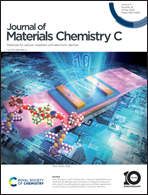Supercooled water induced hysteretic transition in H2SO4-treated PEDOT:PSS†
Abstract
In highly conductive poly(3,4-ethylenedioxythiophene):poly(styrenesulfonate) (PEDOT:PSS) and other conductive polymers, a conductivity peak between 200 and 300 K has been observed in many experiments. The existence of the peak was attributed to different reasons, including metal–insulator transition, mechanical instability, and effects of water. In this work, by using sulfuric acid treated PEDOT:PSS films with a room temperature conductivity of ∼1800 S cm−1, we studied the conductivity peak upon both cooling and warming. The temperatures at which the conductivity peaks appear are between 250 and 260 K for cooling and between 260 and 290 K for warming processes. The hysteresis depends on the temperature ramping rate, which is an indication of the first order phase transition. By varying the sample preparation conditions and the measurement environment, we show that the transition is caused by supercooled water and not by a change from a metallic to an insulating state. The hysteretic transition is also confirmed by temperature-dependent Raman spectroscopy results. Moreover, the Raman spectroscopy and absorption measurement results indicate the doping effect of water molecules. In future studies on the transport behavior of conductive polymers, careful attention is required to rule out the effects caused by water content variations during the measurement.



 Please wait while we load your content...
Please wait while we load your content...